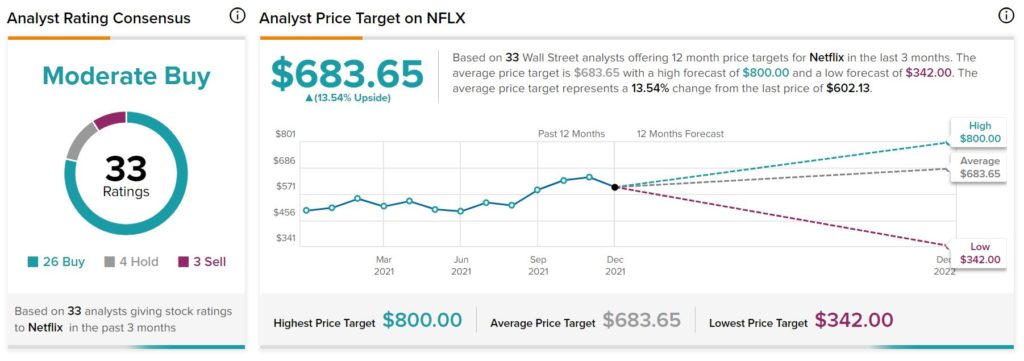Netflix (NFLX) is an online streaming service that is revolutionizing the entertainment industry. It started as a DVD rental company. However, it later expanded into creating its own shows and movies, becoming one of the most popular subscription video-on-demand services in existence today.
Discover the Best Stocks and Maximize Your Portfolio:
- See what stocks are receiving strong buy ratings from top-rated analysts.
- Filter, analyze, and streamline your search for investment opportunities with TipRanks’ Stock Screener.
Although the stock has seen a bit of a correction, shares are still not cheap. As a result, I am neutral on Netflix. (See Analysts’ Top Stocks on TipRanks)
The sentiment is understandable. Netflix recently posted excellent quarterly results. Its program, Squid Game, has broken all sorts of records. Looking ahead, it has a great content slate that will keep people interested till the end of the year.
The only issue investors have with Netflix is when to buy this stock. Its target market is 1 billion broadband households around the world. So, there is a lot of growth still to be done. The $17 billion spent on content production and licensing this year is nothing to fear. If you keep up with Nielsen data, you will see that Netflix regularly dominates the top 10 series rankings.
Some analysts might want Netflix to reduce costs and pare down debt, but the high spending on content prevents them from doing so. Analysts have to understand the nature of the industry. In the streaming wars, you cannot rest on your laurels. On that end, Netflix is doing well.
Content Is King
Netflix had a great third quarter. Subscribers grew 4.4 million, handily beating the company’s estimates of 3.84 million. The streamer had been swamped with viewers as it finally rolled out a plethora of content originally planned for release later in the year.
In a post-earnings statement, Co-CEO Reed Hastings said, “We have so much content coming in Q4 like we’ve never had, so we’ll have to feel our way through and it rolls into a great next year also.”
The virus severely impacted production and release schedules. That problem will hopefully not afflict Netflix in 2022. It is exactly the kind of news investors want, especially with competition ramping up from Apple TV+ (AAPL), Amazon Prime Video (AMZN), HBO Max, Disney+ (DIS), and Peacock (CMCSA).
A section of investors believes Netflix might be stretching itself too thin. Every year, the content budget escalates. However, you have to understand that the company operates a unique business model compared to a Toyota (TM) or a McDonald’s (MCD).
The Netflix Effect
The theaters are closing, and so is the TV. If you see a movie in 2021, it will likely be on Netflix or Amazon Prime Video instead of your local multiplex. The Netflix model has been wildly successful as it grows its subscriber base. This is thanks to its innovative business strategy, which features low price points for unlimited streaming of TV shows or films, accompanied by higher quality than any other service on offer today.
Netflix is the ultimate modern media company. Experts have even coined the term “The Netflix Effect” to explain its preeminence. An unknown actor or series can suddenly be catapulted to superstardom overnight because of the platform.
Money Heist floundered on Spanish television but became one of the biggest hits ever on the platform. The same is true for You, a psychological thriller series canceled by Lifetime after one season in 2018. Netflix swopped in and revived it. Now, it is one of their best performers.
Due to its size and reach, Netflix has better margins than its peers. Every Netflix subscriber has the potential to be a revenue generator, giving them an unmatched advantage over other streaming services. For example, each dollar spent on content for each subscriber generates multiple times the profit than Amazon Prime or Hulu Plus – two competitors with significantly fewer subscribers.
Squid Game, Money Heist, Virgin River, and You are all examples of the power of Netflix as a brand. If these shows had made their debut on any other platform, they would not have had the same level of success. That puts Netflix in a different league.
Localizing Content
Netflix’s international expansion is the key to its success. The streaming service realized that regional programming was most popular in countries like India, Korea, and Japan. Hence, it shifted its focus towards local originals.
Netflix is close to saturation in the U.S. and Canada. Thus, the future is overseas for the streaming giant, with the Asia Pacific region finishing as the biggest contributor to total subscriber growth in the recent quarter. The region was responsible for adding 2.1 million out of 4.38 million subscribers.
There are two reasons for this success. First off, Netflix is particularly focused on international expansion, as it looks to grow its local productions to over 50 countries next year from 45 countries. After all, its company’s biggest hit ever is the Korean drama Squid Game.
Additionally, Netflix has launched low-priced mobile plans in key markets like India, Indonesia, Malaysia, and Thailand. That is also having a snowball effect on subscriber growth in the region.
Risks to the Thesis
The biggest risk for Netflix is increasing competition. Every media company is jumping into streaming, and they have boatloads of cash. The pandemic exacerbated the trend. Therefore, a major issue is how it will manage its budget moving forward.
As the competition ramps up, Netflix cannot afford to take its foot off the gas. That means paying down debt or investing in other areas takes a back seat. Netflix has ventured into gaming and merchandising, but it cannot commit itself fully to any of these areas. It is a video streaming business, first and foremost. That cannot change, considering the competitive nature of the industry.
Another major issue with this business model is a lack of diversification. Amazon, Apple, and The Walt Disney Company are major conglomerates, and streaming is only a portion of their revenues. Even if they do not do well in this area, they have several business areas to fall back on. No such luxury exists for Netflix.
Netflix Is Not a Cheap Stock
Netflix is not a cheap stock. It is a bellwether for the streaming industry, and its price reflects its position. An excellent third quarter means there is limited upside at this point. That will not change for some time. The company is still receiving praise for “Squid Game,” which is estimated to be worth almost $900 million.
Furthermore, its recent addition, “Red Notice,” is now a member of Netflix’s Top 10 Most Popular English Films of all time. Clearly, the streamer is at the top of its game. With a full content slate to end the year, price momentum will not slow down.
The only thing that can potentially knock it off its perch is competition. Disney is perhaps the biggest threat. However, Netflix joined the streaming industry when it was still relatively obscure, which wasn’t the case for Disney or Amazon. As a result, Netflix should hold its own. It has an impressive content library that caters to every section of its audience. Moreover, an asset-light model singularly focused on streaming sets it apart.
The only negative is valuation, as several tailwinds have boosted its share price significantly year-to-date. Hence, value investors will have to employ a wait-and-see approach for now.
Wall Street’s Take
Netflix has long been a Wall Street darling. However, this has changed a bit recently. Netflix has a Moderate Buy consensus rating, based on 26 Buys, four Holds, and three Sells assigned in the past three months. At $683.65, the average Netflix price target implies 13.5% upside potential.

Disclosure: At the time of publication, Faizan Farooque did not have a position in any securities mentioned in this article.
Disclaimer: The information contained in this article represents the views and opinion of the writer only, and not the views or opinion of TipRanks or its affiliates Read full disclaimer >









